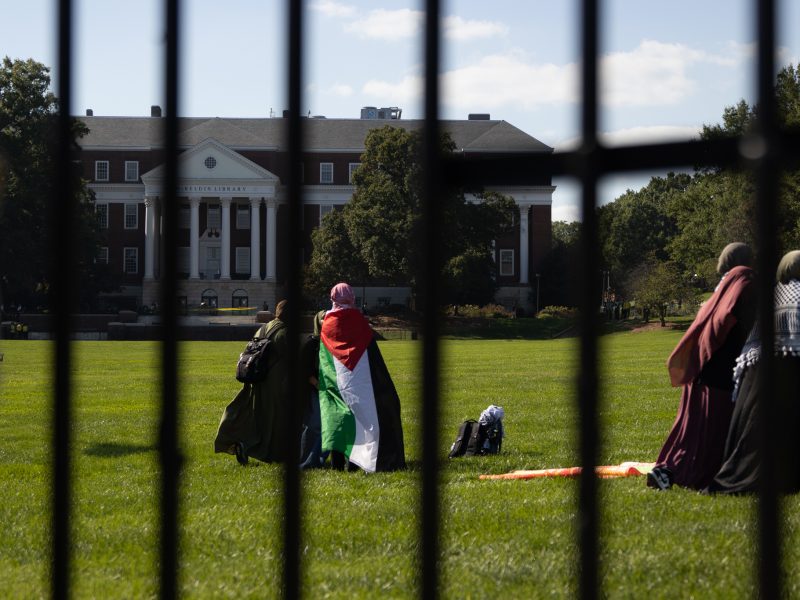
UPPER MARLBORO – A judge ruled Friday that Daniel Murray, the former cell biology and molecular genetics major who once aspired to be a doctor, will spend the next 37-and-a-half years in prison for murdering a fellow student.
More than 80 friends and relatives of senior finance major Michael Scrocca, who died in a Princeton Avenue blaze set by Murray in April 2005, attended the sentencing. During testimony, Scrocca family members and friends remembered him for his charm and loyalty, but also recounted how Scrocca’s murder, which occurred just weeks before the 22-year-old would have graduated, still haunted them.
The murder took place in the early morning hours following a Friday night party at Scrocca’s Princeton Avenue home. According to court records and testimony, Murray had walked past the party and was heckled by partygoers who challenged his masculinity. He may have also been pushed.
Murray, who had been drinking much of the night, returned to the house two hours later, poured fuel on a couch on the front porch and set it ablaze. Scrocca died of smoke inhalation, and his roommate Stephen “Tex” Aarons jumped from a second-story window to escape the flames.
“Imagine the blackest black you’ve ever seen just coming at you from all angles,” Aarons said during testimony Friday. “I couldn’t even scream; I was choking on smoke.”
Murray also addressed the court Friday, speaking through tears as he faced the judge.
“I never intended to hurt anyone,” Murray said in a voice barely audible to the back of the courtroom where family and friends on both sides sat. “I’m just sorry.”
Before Judge Thomas Smith handed down the nearly four-decade sentence, which under a plea agreement Murray will be barred from appealing, the judge expressed concern over Murray’s apparent lack of regret throughout hearings scattered over the course of nine months.
“Until 30 seconds ago, I’ve never seen or heard any evidence that this defendant has shown any remorse for his actions,” Smith said.
Smith also said he was displeased that six of Murray’s friends and acquaintances – described by investigators as students – knew for a year of the crime but never told police. After police received an anonymous tip and jailed Murray, Smith said he was also disturbed by the fact that Murray tried to get cellmates’ girlfriends to commit perjury in a desperate attempt to confuse investigators about the crime.
“It was rainy. You were walking toward the Metro and saw a black guy set something on fire on the porch,” Murray told a cellmate in a recording played during the sentencing hearing. “You had good reason for not coming forward.”
Investigators had wired the cellmates to record the conversations, then presented the tapes as evidence during hearings in January. The mounting evidence led to Murray’s guilty plea, which he offered in an agreement that helped him avoid a life sentence.
But after Brian Scrocca waited a year since his brother’s death before authorities even had a suspect in the case, and another before Murray confessed, the ruling still could not bring him total closure, he said.
Although Murray’s parents testified their son was a “kind, generous, intelligent, hilarious person,” Assistant State’s Attorney John Maloney painted Murray as a manipulative murderer who failed to show any remorse. Murray’s friends, who had been present at his bail hearing, did not testify and did not appear to attend the hearing.
Murray avoided eye contact and hung his head for most of the hearing as Maloney presented the evidence: two jail-cell recordings indicating his guilt, a confession to police and two recorded phone calls. In one of those calls played in court, he told his mother of the prosecution’s case, “The more and more I think about it, it’s just going to be so crazy and so stupid. … When we go to trial, they’re just going to be like, how did this get up here?”
The emotional height of the trial came when Scrocca’s family and friends testified. It was the first time any of them had spoken before a judge.
Aarons, Scrocca’s roommate at the time of his death, said he still struggles to sleep at night, and for a time relied on medication to overcome the visions he still had of the burning house and his lost friend.
“Every night before I go to bed I can’t not think about this fire,” he said, before turning his attention to Murray. “He took a life. He almost took seven more. … We’re never going to be the same.”
Scrocca’s mother, Mary, said during testimony, “There is never closure, and you can never move on after losing a child.”
Contact reporter Ben Slivnick at slivnickdbk@gmail.com.


